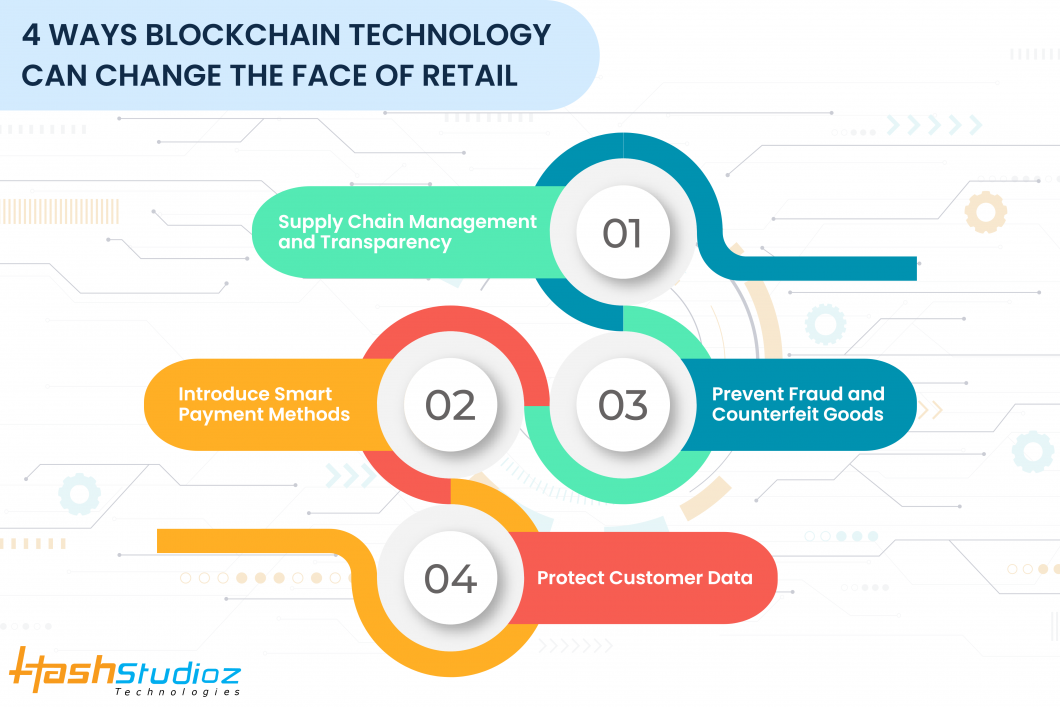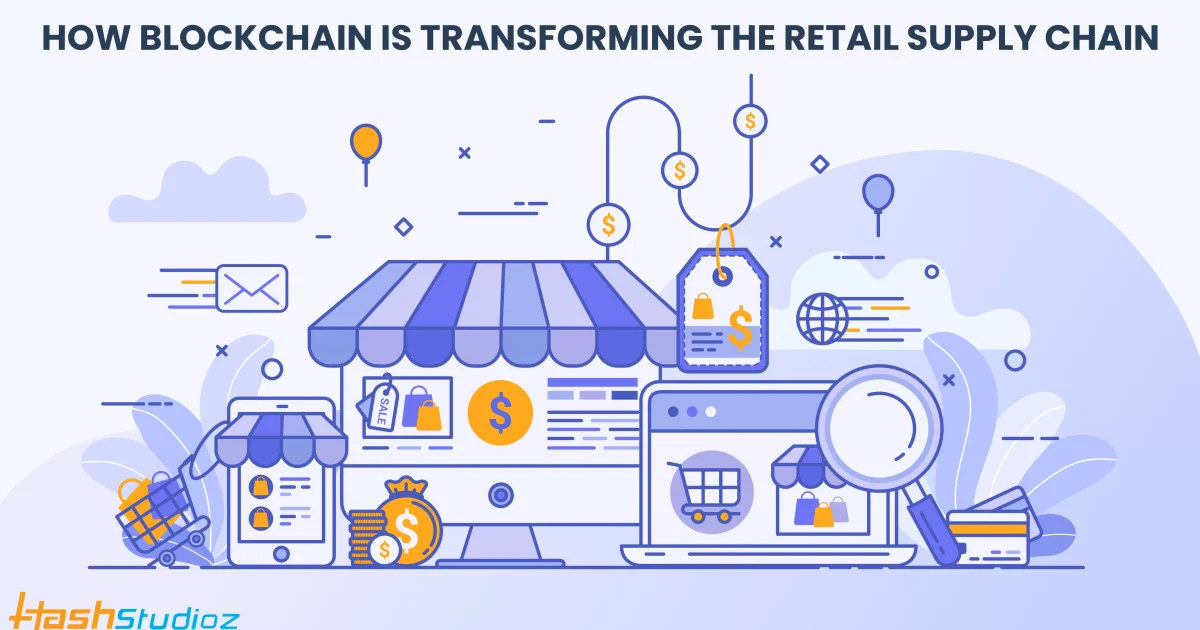Everything is affected by innovative technological trends. Every industry it affects is changing in some manner, improving, and bringing up new opportunities for growth. This article will focus on one aspect of that world: Blockchain Technology in the Retail Supply Chain.
Every day, we have to deal with the retail industry. Do you want to learn about what blockchain technology can do for the retail industry? You’ll find out in this article!
Table of Contents
What Is Blockchain In the Supply Chain?
A blockchain supply chain can solve a variety of issues. When used in financial transactions, it can help supply chain management procedures operate more smoothly.
There are various processes in a typical supply chain, such as production, financing, procurement, and so on, and one or more transactions can occur between these operations. These transactions are recorded on the blockchain blocks and in many copies throughout the whole record in a blockchain supply chain.
These records are subsequently spread across the blockchain’s network of computer systems, making the data extremely accessible and transparent. Every transaction that occurs in the supply chain is recorded and reflected in real time on the blockchain. Everyone is effectively a real-time participant in all interactions.
Why Blockchain is important to the retail industry?
Blockchain is a decentralized database made up of a chain of blocks that allows data to be transferred directly from one server to another. Each block includes encrypted information that each network user may access. Every transaction contains a timestamp. In general, blockchain is a method of direct data transmission that is more secure and faster than traditional methods.

In a few words, the retail industry’s blockchain requirements are as follows:
security,
automation,
optimization
Security, Blockchain has gained popularity and confidence among millions of individuals.
Automation, Something that every business, not just retail, wants and which may be realized thanks to this decentralized network and all of the data it possesses.
Optimization, blockchain is mainly about artificial intelligence, but it can also be used to improve financial transactions by reducing the need for third-party services and commissions.
4 Ways Blockchain Technology Can Change the Face of Retail

1. Supply Chain Management and Transparency– Supply networks are complex, with many interconnections and inefficiencies. Supply chains can cover multiple stages, and geographical areas can have different companies, invoices, and payments, depending on the business and product type. Keeping track of all the elements involved (organizations, departments, resources, etc.) becomes difficult as the chain expands in size. Because of the lack of transparency in the supply chain, issues such as overhead costs, profit margin disruption, and fake items arise. Blockchain can assist in overcoming these limits and optimizing the supply chain. A Blockchain is a distributed database ledger that runs over a network of nodes at its core. It creates an endless chain of records (in cryptographic format) that allows retailers to verify and authenticate transactions. The complete product cycle may be tracked from source to distributor to client.
2. Prevent Fraud and Counterfeit Goods– Theft, fraud, and human error cost merchants billions every year. Fraud and counterfeiting have a financial cost as well as a negative impact on a brand’s market value and image.
For Customers:
Thanks to blockchain, Customers will have solid confirmation of the source and validity of their products at every point in the supply chain. Customers who can track the validity of the products they’re buying can make more confident purchases.
For Retailers:
Blockchain can aid in the tracking and validation of goods. It can give us an idea of a product in real time, including who handled it, where it went, and when. There are fewer stolen, lost, or damaged products when the story of a product is traced.
3. Introduce Smart Payment Methods – Blockchain has been generally recognized and approved as a secure method of conducting financial transactions. Retailers who utilize Blockchain for payments.
Accept cryptocurrency payments, which provide cross-border and micro-payment benefits. eCommerce platforms may include cryptocurrency acceptance into their apps, making payment choices more flexible and safe. This is beneficial, especially for international e-retailers that want to avoid the hassles of accepting many currencies. Financial transactions using Bitcoin can assist to keep track of all transactions, which can help to simplify returns and refunds.
One of the most popular Blockchain applications is smart contracts, which can be used for quick payments, automatic refunds, and paperless contracts with merchants, suppliers, distributors, and other stakeholders involved in the product cycle.
4. Protect Customer Data– Digital platforms receive a lot of data from customers. This information also includes personal information, medical information, and financial information. Businesses usually keep client data in separate databases, leading to a single point of failure. Customer information can be held in a single, decentralized, unhackable ledger using Blockchain. This data is accessible only to those who have the cryptographic private key.
What Are The Challenges In Supply Chain Management?
1. No universal database- Despite the fact that our world has become increasingly interconnected, various organizations actually keep their databases private. All of the teams are keeping their own records and only sharing them with one another on request. As a result, different communication gaps exist between any two parties, which helps the exploiters.
2. Insufficient asset traceability- The inability to track assets is another issue in supply chain management. They have put in place the best equipment and systems for monitoring internal activities, but there’s no way to track the status of products once they’ve been delivered. This makes it easy for exploiters to substitute ‘lookalike’ counterfeit products for authentic ones.
3. Unnecessary expenses- Since each team generates and maintains its own database of data, they usually invest time and resources in acquiring the same information. This results in a significant increase in the related cost.
4. Inability to meet client demands- When using the present supply chain management procedure, entrepreneurs are also finding it difficult to keep current with changing consumer needs and make necessary adjustments to their working strategies.
Because of these challenges in the supply chain and increased competition, most, if not all, businesses have begun to express interest in the notion of incorporating Blockchain into the supply chain. They are working to understand the fundamentals of Blockchain and how it is transforming several industries, such as Real Estate, Healthcare, Fintech, and Enterprise.
Benefits of Using Blockchain in Supply Chain

Increase Security
Your data is sensitive and important, and blockchain can significantly change the way you view important information. By creating a record that cannot be changed and is fully encrypted, blockchain helps prevent fraud and unauthorized activity. Privacy issues on the blockchain can also be addressed by anonymizing personal data and user permissions to prevent access. The information is stored in a network of computers rather than servers, making it difficult for hackers to view the data.
More Transparency
Without blockchain, each organization would have to maintain a separate database. Since the blockchain uses a distributed ledger, transactions, and data are recorded identically across multiple locations. All network participants with permitted access see the same information at the same time, providing complete transparency. All transactions are recorded irreversibly and are time- and date-stamped. It enables members to view the complete history of transactions and virtually eliminates any possibility of fraud.
Instant Traceability
Blockchain creates an audit trail that documents the emergence of an asset at every step of its journey. In industries where consumers are concerned about environmental or human rights issues surrounding a product – or an industry plagued by counterfeiting and fraud – it helps to provide evidence. With blockchain, it is possible to share data about origin directly with customers. Traceability data can also uncover vulnerabilities in any supply chain – where goods can sit on a loading dock waiting to be in transit.
Increased efficiency and speed
Traditional paper-heavy processes are time-consuming, prone to human error, and often require third-party mediation. Transactions can be conducted faster and more efficiently by using blockchain to streamline these procedures. Documents can be stored on the blockchain along with transaction details, eliminating the need for paper exchanges. There is no need to reconcile multiple accounts, so clearing and settlement can be much faster.
Automation
Transactions can also be automated with “smart contracts”, which increases your efficiency and makes the process even faster. The next stage of the transaction or process is automatically launched once the pre-specified requirements are satisfied. Smart contracts minimize human intervention as well as reduce the reliance on third parties to verify that the terms of the contract have been met. In insurance, for example, once the customer has provided all the required documents to file a claim, the claim can be settled and paid automatically.
Most Significant Blockchain Technology Use Cases in the Supply Chain
Although examples of supply chain blockchains are still scarce, a growing number of supply chain management use cases for blockchains are being investigated, including:
Finance for Supply Chains
There have been a lot of talks recently about blockchain and supply chain finance technologies as they can improve invoice processing efficiency and provide more open and secure transactions.
Invoice payment periods, for example, are typically 30 days but may be longer. By integrating supply chain finance and blockchain technology, you can use smart contracts to initiate instant payments as soon as a product is shipped and signed.
Supply Chain Logistics
With so many go-betweens and so much back-and-forth between partners, friction is a major issue in modern supply chains. As a result, vendors, providers, and consumers communicate through third-party organizations rather than dealing with each other directly. According to DHL, the promise of blockchain in supply chain logistics is that transactions can be authenticated, tracked, and coordinated autonomously without the involvement of third parties while removing a full layer of complexity from global supply chains.
Payment to Stakeholders
Payments to stakeholders – through the use of an encrypted distributed ledger, which provides reliable real-time verification of transactions without the need for intermediaries such as correspondent banks and clearinghouses, blockchain technology enables fast, secure, low-cost international payment processing services (and other transactions). Promises to make it convenient. Using cryptocurrency, this blockchain technology in the supply chain ensures that farmers are paid directly for the sale of their goods.
Cold Chain Traceability
Food and pharmaceutical products have a lot to offer when it comes to storage and distribution. Temperature, humidity, vibration, and other environmental metrics can be recorded using blockchain and IoT sensors on the products. The data is stored in a blockchain, and smart contracts are used to ensure that if any readings go out of bounds, they are automatically corrected.
The unprecedented use of blockchain by Walmart to monitor the origin and quality of pork products originating from China is an early example of blockchain in the food supply chain.
Keeping Food Healthy and Safe
Cross-contamination and isolation are difficult to monitor and isolate in many food safety problems. The lack of documentation and visibility in the supply chain results in slow response times when a problem occurs, as well as the financial and reputational cost of unnecessary waste and recalls.
Companies such as Nestle, Walmart, and Unilever are using blockchain to speed up the process of identifying and eliminating the source of foodborne illness in the supply chain.

The Future Is Bright for Blockchain Technology in Supply Chain Management
The cases for using blockchain in complex supply chain scenarios are increasing every day. There will be a growing demand for people with real-world blockchain expertise who can easily build blockchain networks, deploy smart contracts, and ensure the security and efficiency of their companies’ creation and distribution capabilities.
Supply chain management is one of the many areas affected by blockchain technology. However, in order to successfully integrate technology into your supply chain management, it is important that you position yourself with a set of top blockchain technology trends and technologies that will yield better results in the near future. It is also important to hire the best Blockchain Development Company that can make the process of blockchain adoption across your entire supply chain smooth and profitable.
As distributed ledger technology, blockchain has the capability to provide networks and organizations improved security, transparency, accountability, and efficiency.
And if you want your business to process fast with higher security, then you must check our Blockchain Development Services or contact us to discuss your requirements.




